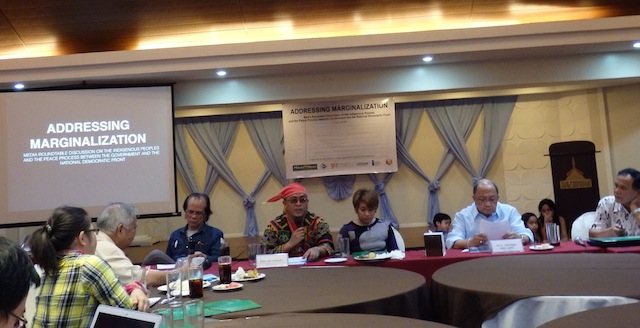DAVAO CITY (MindaNews / 29 September) — The situation of the Indigenous Peoples (IPs) will form part of discussions on socioeconomic reforms in the ongoing peace negotiations between the Philippine government and the National Democratic Front, two government peace panel members said in a forum Wednesday.
At the media roundtable on “Addressing Marginalization: the Indigenous Peoples and the Peace Process between Government and the National Democratic Front,” lawyer Angela Librado-Trinidad said IP issues were tackled during the Social Development Agenda Summit on August 17 and 18 and these will be considered in the crafting of the Comprehensive Agreement on Social and Economic Reforms (CASER).
 Media roundtable on “Addressing Marginalization: the Indigenous Peoples and the Peace Process between Government and the National Democratic Front, held 28 September 2016 a the Pinnacle Hotel in Davao City. MIndaNews photo
Media roundtable on “Addressing Marginalization: the Indigenous Peoples and the Peace Process between Government and the National Democratic Front, held 28 September 2016 a the Pinnacle Hotel in Davao City. MIndaNews photo
Both parties had agreed during the first round of formal peace talks in Oslo, Norway last month that the Reciprocal Working Committees on the CASER “will endeavor to complete their work within six months from August” or by February 2017.
The second round of talks is on 6 to 10, also in Oslo.
Trinidad said the Lumad, refering to the ethnolinguistic groups in Mindanao, have complained of harassment by armed groups.
She said this is why President Rodrigo Duterte has ordered the Armed Forces to disband paramilitary groups.
“[This is] an issue raised to us by bishops and tribal leaders,” she said.
Lawyer Antonio Arellano, also a GRP peace panel member said that as far as the IP are concerned the government is guided by the 1987 Constitution, particularly Article XII, Section 5 which mandates that the State “shall protect the rights of indigenous cultural communities to their ancestral lands to ensure their economic, social and cultural well being.”
Arellano also cited the Indigenous Peoples Rights Act (IPRA) of 1997 which recognizes the IP’s rights to their ancestral lands.
He said the government is aware of the “slow implementation of the law (IPRA)” but recognizes at the same time that it “could provide the IP chances to participate in national development.”
He, however, acknowledged that there may be provisions of IPRA that need to be amended.
Kerlan Fanagel, chair of the PASAKA Confederation of Lumad Organizations in Southern Mindanao, said the CASER should ensure their collective rights to their ancestral lands and self-determination.
He pushed for the strict implementation of the Comprehensive Agreement on Respect for Human Rights and International Humanitarian Law (CARHRIHL) to protect the Lumad from abuses arising from the armed conflict between government and the New People’s Army.
Both parties signed the CARHRIHL on March 16, 1998 under the Ramos administration. It is one of the four-item agenda under the peace negotiations, the others being CASER, political and constitutional reforms, and end of hostilities and disposition of forces, to be tackled in that order.
Jimid Mansayagan, chair of the Governing Council of Lumad Mindanaw People’s Federation lamented that some tribal leaders have become targets of reprisal by the NPA for being “enemies of the people.”
He said that as early as 1992 he had brought this matter up to the late NDF leader Antonio Zumel.
Soldiers and paramilitary groups have been tagged as responsible for the death of some Lumad leaders.
However, the NPA has also figured in the killing of tribal leaders believed to be supportive of the military or government.
Arellano clarified that as far as government is concerned, the first thing is to stop the war so that programs and reforms can be implemented.
He said the negotiations intend “to address a real situation which is armed conflict, which can be resolved by peace settlement.”
“Why is there armed conflict? Find solutions that are acceptable to the armed groups. It (peace process) can’t address all issues at once. Armed conflict should be resolved first so that reforms can be implemented.”
He acknowledged that the NDF “carries the concerns being raised now.” (H. Marcos C. Mordeno / MindaNews)
